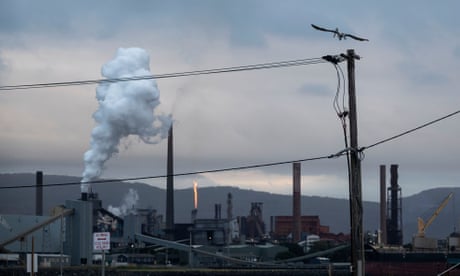- by foxnews
- 05 Apr 2025
Captured by coal: NSW government overturns decision to block mine expansion
Captured by coal: NSW government overturns decision to block mine expansion
- by theguardian
- 06 Dec 2021
- in news

The New South Wales government has been accused of being "captured" by the coal industry after it overturned a planning commission decision to block a mine expansion that it found could cause irreversible damage to drinking water and release significant heat-trapping gas.
The deputy premier, Paul Toole, and planning minister, Rob Stokes, declared on Saturday the Dendrobium mine expansion near Wollongong - proposed by BHP spin-off South32 - was "state significant infrastructure" due to its role providing coal for the Port Kembla steelworks.
It reversed a planning commission decision in February to reject the proposal, which would have allowed the company to extract an extra 78m tonnes of coal from two areas near the Avon and Cordeaux dams. The dams supply water to metropolitan Sydney and the Macarthur, Illawarra and Wollondilly regions.
The commission found South32 had failed to properly quantify the risk of long-term and potentially irreversible impacts, "particularly on the integrity of a vital drinking water source".
It also factored in the project's greenhouse gas emissions - estimated across the life of the project to be more than 250m tonnes, roughly half Australia's annual carbon pollution - and judged the project was not in the public interest.
The state government did not mention the water supply or emissions in its statement about the mine expansion. Toole said Dendrobium was a critical source of coking coal for the Port Kembla steelworks and declaring it significant infrastructure would "provide thousands of workers with greater certainty on the future of their jobs". He said the mine contributed $1.9bn to the state's economy each year.
The NSW government also confirmed it had ruled out future coal exploration in the Hawkins and Rumker areas in the state's central west, a step flagged by Guardian Australia last month.
South32 said it welcomed the government's decision. A company spokesperson said it "marks an important step" and would allow a submission for an alternate mine plan to that rejected by the planning commission.
"We continue to consider our options to determine the best path forward for Illawarra Metallurgical Coal, to continue to supply metallurgical coal for local steel production and support local jobs and investment," it said.
The Dendrobium declaration means South32 can submit an environmental impact statement for community feedback and assessment by the planning department. The department previously recommended the independent planning commission approve the project as its benefits would "significantly outweigh its residual costs, and that it is in the public interest".
It has been supported by Bluescope Steel, which claimed "green steel" - made using hydrogen and renewable energy - was decades away and it wanted to use an existing blend of coking coal until 2048.
Steelmaking is one of the biggest emitters of greenhouse gas emissions worldwide. A Grattan Institute report last year found an Australian green steel industry could employ 25,000 people in regional areas largely reliant on coalmining.
The independent MP Justin Field said the government's decision risked making the NSW planning system a "farce" unless there was an independent economic assessment of the need for the project to support local steel manufacturing.
He said the planning commission had found most of Bluescope's coal needs came from other mines and the majority of Dendrobium coal over the next 20 years would be exported or transported elsewhere.
"Aside from the well-understood climate impacts and risks to the drinking water catchment from the proposal, the [planning commission] in their February decision effectively rejected the assumptions by South32 that the expansion of the Dendrobium coalmine was needed to support Bluescope's operations in the Illawarra," Field said.
"If the government is going to override the analysis of the [planning commission] they need to demonstrate the economic justification through a credible independent assessment. It is untenable for the NSW Department of Planning Industry and Environment to do that assessment because they previously backed the flawed claims by South32 that were rejected by the [commission]."
Dan Gocher, director of climate and environment at shareholder activist organisation the Australasian Centre for Corporate Responsibility, said the Dendrobium decision "reeks of state capture".
He said South32 and the NSW Minerals Council had lobbied the government for months to overturn the commission's decision. He said the proposal rejected by the planning commission could have drained up to 8bn litres of drinking water from the Illawarra-Sydney catchment a year, destroying fragile wetlands sitting above the site. "Despite these risks, the NSW government has simply rolled over for the coal industry," he said.
Gocher said the International Energy Agency had found there should be no new fossil fuel projects if the world was to keep alive the possibility of limiting global heating to 1.5C, a goal included in the Paris climate agreement and recent Glasgow climate pact.
A report by the Australia Institute released during the Cop26 climate summit in Glasgow last month said the country had more than 100 fossil fuel developments in the pipeline that could result in nearly 1.7bn tonnes of greenhouse gases a year - equivalent to about 5% of global industrial emissions - if all were to go ahead.
- by foxnews
- descember 09, 2016
Excavation near site where Jesus was crucified and buried results in ancient discovery
Proof of ancient olive trees and grapevines, consistent with a Bible verse, has been found at the Church of the Holy Sepulchre in Jerusalem, an archaeologist confirms.
read more


